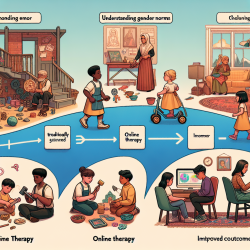Introduction
In the realm of pediatric therapy, understanding the intricate relationship between congenital conditions and therapeutic outcomes is crucial. A recent study titled "Developmental Disabilities and Intracranial Abnormalities in Children with Symptomatic Cytomegalovirus and Cochlear Implants" offers valuable insights into how practitioners can enhance outcomes for children with symptomatic congenital cytomegalovirus (CMV) who have undergone cochlear implantation.
Understanding the Study
The study, conducted at Cincinnati Children's Hospital Medical Center, involved a retrospective review of 15 children with symptomatic congenital CMV who received cochlear implants (CIs) between 2004 and 2010. The researchers examined the association of intracranial radiographic abnormalities and developmental measures with post-implantation outcomes.
Key Findings
- Cognitive Delays: A significant 73% of the children exhibited cognitive delays, with a median IQ/DQ of 65. This highlights the prevalence of cognitive impairments in this population.
- Imaging Abnormalities: All children showed central nervous system abnormalities on imaging, primarily in the parietal and temporal lobes, which correlated with poorer post-CI outcomes.
- Head Circumference: Children with a head circumference below the 5th percentile had poorer post-CI audiometric and language outcomes.
Implications for Practitioners
For practitioners working with children with symptomatic congenital CMV, these findings underscore the importance of early and comprehensive assessments. Here's how practitioners can leverage these insights:
- Comprehensive Assessments: Utilize brain imaging and developmental assessments to identify potential challenges early. This can guide the development of tailored intervention plans.
- Parental Counseling: Use imaging and developmental data to provide parents with realistic expectations regarding post-implantation outcomes, fostering a collaborative approach to therapy.
- Targeted Interventions: Design interventions that address specific developmental delays and cognitive impairments, leveraging the auditory benefits of cochlear implants.
Encouraging Further Research
While this study provides valuable insights, it also highlights the need for further research. Practitioners are encouraged to explore the following areas:
- Investigate the long-term outcomes of children with symptomatic congenital CMV and cochlear implants.
- Examine the impact of early intervention on cognitive and language development in this population.
- Explore the role of additional therapies, such as speech and language therapy, in enhancing post-CI outcomes.
Conclusion
The study on children with symptomatic congenital CMV and cochlear implants provides a roadmap for practitioners aiming to improve outcomes in this unique population. By leveraging data-driven insights and embracing a holistic approach to therapy, practitioners can unlock the potential of these children, paving the way for a brighter future.
To read the original research paper, please follow this link: Developmental Disabilities and Intracranial Abnormalities in Children with Symptomatic Cytomegalovirus and Cochlear Implants.










